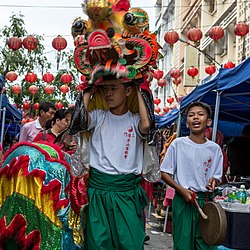
Back Hakka (volk) Afrikaans Ngayngay AMI هاكا (عرقية) Arabic Hakka AST Hakka Catalan Káh-gă CDO Hakka German Hakka Spanish Hakka etnia Basque مردم هاکا Persian
This article may require cleanup to meet Wikipedia's quality standards. The specific problem is: Significant unsourced material, often poorly organized and ungrammatical. (April 2024) |
 Hakka dancers performing traditional Qilin dance in Malaysia | |
| Total population | |
| 80 million[2] | |
| Regions with significant populations | |
| China, Taiwan, Southeast Asia, Europe, Americas | |
| Languages | |
| Religion | |
| Chinese folk religion, Confucianism, Taoism, Mahayana Buddhism, Christianity, Islam |
| Hakka people | |||||||||||||||||||||||||||||||||||
|---|---|---|---|---|---|---|---|---|---|---|---|---|---|---|---|---|---|---|---|---|---|---|---|---|---|---|---|---|---|---|---|---|---|---|---|
| Chinese name | |||||||||||||||||||||||||||||||||||
| Chinese | 客家 | ||||||||||||||||||||||||||||||||||
| Literal meaning | guest families | ||||||||||||||||||||||||||||||||||
| |||||||||||||||||||||||||||||||||||
| Vietnamese name | |||||||||||||||||||||||||||||||||||
| Vietnamese | người Khách Gia, người Hẹ | ||||||||||||||||||||||||||||||||||
The Hakka (Chinese: 客家), sometimes also referred to as Hakka Han,[1][3] or Hakka Chinese,[4] or Hakkas, are a southern Han Chinese subgroup whose principal settlements and ancestral homes are dispersed widely across the provinces of southern China and who speak a language that is closely related to Gan, a Han Chinese dialect spoken in Jiangxi province. They are differentiated from other southern Han Chinese by their dispersed nature and tendency to occupy marginal lands and remote hilly areas. The Chinese characters for Hakka (客家) literally mean "guest families".[5]
The Hakka have settled in Guangdong, Fujian, Jiangxi, Guangxi, Sichuan, Hunan, Zhejiang, Hainan, and Guizhou in China, as well as in Taoyuan City, Hsinchu County, Miaoli County, Pingtung County, and Kaohsiung City in Taiwan). Their presence is especially prominent in the Lingnan or Liangguang area, comprising the Cantonese-speaking provinces of Guangdong and Guangxi. Despite being partly assimilated to the Cantonese-speaking population, they retain a significant presence in there.
Like the other southern Han Chinese subgroups, Hakka mainly comprise Central Plains Chinese refugees fleeing social unrest, upheaval, and invasions. However, the Hakka were different in being late arrivals, moving from Central China into Southern China when the earlier groups of Han Chinese settlers in the south already developed distinctive local identities and languages[6][7]. Their migration path was also different, and they entered Guangdong, Guangxi and Fujian via Jiangxi province, instead of traversing Hunan or moving along the Fujian cost.
Today, substantial numbers of Hakka Chinese have migrated overseas to various countries throughout the world.[8][2]
- ^ a b Rubinstein, Murray A. (2004), "Rethinking Taiwanese and Chinese Identity: Melissa J. Brown's Is Taiwan Chinese?" (PDF), iir.nccu.edu.tw, vol. 40, Institute of International Relations, pp. 454–458, ISSN 1013-2511, OCLC 206031459, archived from the original (PDF) on 27 July 2011
- ^ a b "客家文化探密:怀念先人 感念生活 客家人闹元宵". news.sina.com.cn.
- ^ "Hakka culture GuangdongCulture". Newsgd.com. Retrieved 15 January 2015.
- ^ Yen, Ching-hwang (21 July 2008). The Chinese In Southeast Asia and Beyond: Socioeconomic and Political Dimensions. World Scientific. p. 379. ISBN 978-981-4471-99-2.
- ^ LaCroix, Frederick E. (2009). The sky rained heroes: A journey from war to remembrance. Austin: Synergy Books. p. 56. ISBN 978-0-9821601-3-8.
- ^ Li, Hui; Pan, Wu-Yun; Wen, Bo; Yang, Ning-Ning; Jin, Jian-Zhong; Jin, Li; Lu, Da-Ru (September 2003). "Origin of Hakka and Hakkanese: a genetics analysis". Acta Genetica Sinica. 30 (9): 873–880. PMID 14577381.
- ^ "The Hakka: The Jews of Asia". Edu.ocac.gov.tw. Archived from the original on 9 September 2019. Retrieved 15 January 2015.
- ^ "Welcome to Longyan Municipal People's Government, PRC". English.longyan.gov.cn. Archived from the original on 6 April 2014. Retrieved 15 January 2015.
© MMXXIII Rich X Search. We shall prevail. All rights reserved. Rich X Search